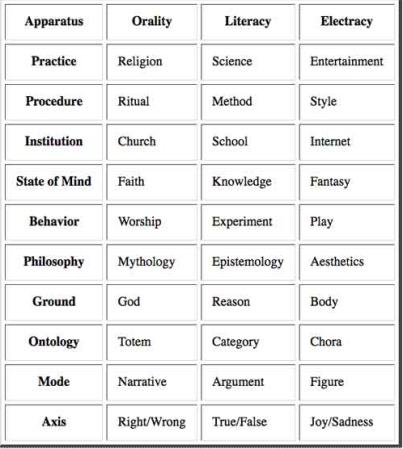Nicholas Carr’s article titled “Is Google Making Us Stupid?” and Gregory Ulmer’s theory of Electracy deeply explore reading and thinking. Carr’s article goes into depth about how our minds have changed through time as there has been more of a desire to expand the power of the internet. Ulmer’s Electracy theory ties into this by explaining the necessity of media and exhausting the best resources available to present a message. (Before we begin, if you’d like to be more familiar with Ulmer’s Electracy theory, you can watch a short video clip talking about the prevalence and necessity of his theory today.)

Carr repeatedly references how reading is becoming more and more of a struggle to process and retain information. It’s often that he will automatically default back to skimming when he sees large chunks of texts. This has been happening because over time, efficiency became more and more important. Our culture is obsessed with the “quick wins” and having to be heavily provoked and stimulated to be able to keep our interest going and curious enough to continually take in information. This makes genuinely reading a long piece of text for a long amount of time proves to be so challenging for many people. Even Scott Karp, who was a lit major and then is currently a blog writer, claims that he has completely lost interest in reading altogether. This is very scary to think about because his career has been very reading orientated and now he can barely read.
This pushes you to ask what this problem is. Clearly the circumstances readers find themselves in is totally different now than it was thirty years ago.Well, the internet has surely changed and will continue to improve. This rapid requirement has also altered the way we think because Maryanne Wolf says it perfect by saying that “We are how we read.” Because of the internet, we now have a different way of processing information than we did have before. We do a lot less searching but plenty of more time absorbing information that is spoon fed to us.
Thinking is not instinctive, it is not in our genes. Rather, how we read leads to how we think because through time, we teach ourselves how to think. We learn how to interweave the process of intaking information and then the processing of all of the information. This is the reason why people who speak English think Chinese is so hard. Unlike in English where combinations of letters make sounds that actually mean something later on, Chinese is completely different because the entire meaning of one word is associated to a picture rather than letters that can be sounded out.

The two men who invented Google: Sergey Brin and Larry Page, make it apparent that the ultimate goal of Google is for it to be “something as smart as people– or smarter.” This is scary to think about because when something created by man becomes smarter than man, we become unable to be in control of this and risk what we are in control of. In addition, we also lose the sacredness and the serenity within one’s mind, away from everything else in the world that screams for attention. In that same place is how we see everything else in the world and slowly but surely it is diminishing more and more as it becomes less and less activated because of the demand for efficiency roars louder than ever before.
How to read and think becomes even more complex when electracy is mixed in because in order to unlock all that digital communications has to offer, it is imperative that electracy is present. Electracy is defined as George Ulmer’s key to fully explore and exhaust the usage of the digital realm through using multimedia, virtual worlds, and other forms of media.This is key because its extensive complexity is satisfying to one’s curiosity and is a holistic approach of engaging the mind that is thirsting for knowledge. The aesthetics of electracy become just as important to language and art as other aspects of sending the message.
The world will continue to grow in technology and media, and I’m confident that other theories in addition to electracy will become even more prominent in the future. While this seems unstoppable, let us not grow weary of clinging on to the sacredness of what is in our minds and hearts by compromising all of that for efficiency. Let us also not lose sight of earnestly seeking truth and using technology as a means of helping us along on that mission.
________________________________________________
http://www.theatlantic.com/magazine/archive/2008/07/is-google-making-us-stupid/306868/
http://ulmer.networkedbook.org/the-learning-screen-introduction-electracy/

